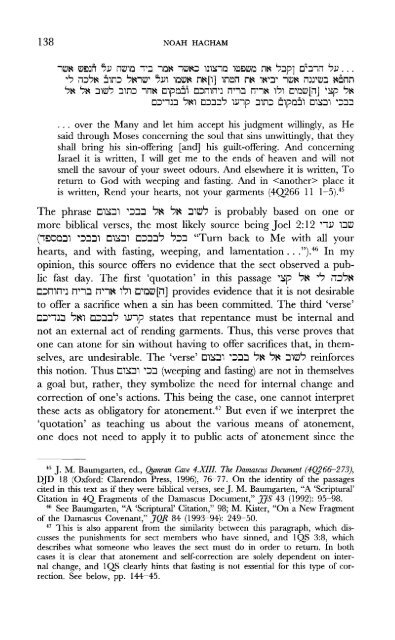historical perspectives: from the hasmoneans to bar kokhba in light ...
historical perspectives: from the hasmoneans to bar kokhba in light ...
historical perspectives: from the hasmoneans to bar kokhba in light ...
Create successful ePaper yourself
Turn your PDF publications into a flip-book with our unique Google optimized e-Paper software.
138 NOAH HAGHAM<br />
. . . over <strong>the</strong> Many and let him accept his judgment will<strong>in</strong>gly, as He<br />
said through Moses concern<strong>in</strong>g <strong>the</strong> soul that s<strong>in</strong>s unwitt<strong>in</strong>gly, that <strong>the</strong>y<br />
shall br<strong>in</strong>g his s<strong>in</strong>-offer<strong>in</strong>g [and] his guilt-offer<strong>in</strong>g. And concern<strong>in</strong>g<br />
Israel it is written, I will get me <strong>to</strong> <strong>the</strong> ends of heaven and will not<br />
smell <strong>the</strong> savour of your sweet odours. And elsewhere it is written, To<br />
return <strong>to</strong> God with weep<strong>in</strong>g and fast<strong>in</strong>g. And <strong>in</strong> place it<br />
is written, Rend your hearts, not your garments (4Q266 11 1—5). 45<br />
more biblical verses, <strong>the</strong> most likely source be<strong>in</strong>g Joel 2:12<br />
^DIl "Turn back <strong>to</strong> Me with all your<br />
hearts, and with fast<strong>in</strong>g, weep<strong>in</strong>g, and lamentation . . ."). 46 In my<br />
op<strong>in</strong>ion, this source offers no evidence that <strong>the</strong> sect observed a public<br />
fast day. The first 'quotation' <strong>in</strong> this passage<br />
provides evidence that it is not desirable<br />
<strong>to</strong> offer a sacrifice when a s<strong>in</strong> has been committed. The third 'verse'<br />
states that repentance must be <strong>in</strong>ternal and<br />
not an external act of rend<strong>in</strong>g garments. Thus, this verse proves that<br />
one can a<strong>to</strong>ne for s<strong>in</strong> without hav<strong>in</strong>g <strong>to</strong> offer sacrifices that, <strong>in</strong> <strong>the</strong>mselves,<br />
are undesirable. The 'verse' re<strong>in</strong>forces<br />
this notion. Thus (weep<strong>in</strong>g and fast<strong>in</strong>g) are not <strong>in</strong> <strong>the</strong>mselves<br />
a goal but, ra<strong>the</strong>r, <strong>the</strong>y symbolize <strong>the</strong> need for <strong>in</strong>ternal change and<br />
correction of one's actions. This be<strong>in</strong>g <strong>the</strong> case, one cannot <strong>in</strong>terpret<br />
<strong>the</strong>se acts as obliga<strong>to</strong>ry for a<strong>to</strong>nement. 47 The phrase<br />
is probably based on one or<br />
But even if we <strong>in</strong>terpret <strong>the</strong><br />
'quotation' as teach<strong>in</strong>g us about <strong>the</strong> various means of a<strong>to</strong>nement,<br />
one does not need <strong>to</strong> apply it <strong>to</strong> public acts of a<strong>to</strong>nement s<strong>in</strong>ce <strong>the</strong><br />
45 J. M. Baumgarten, ed., Qumran Cave 4.XIII. The Damascus Document (4Q266-273),<br />
DJD 18 (Oxford: Clarendon Press, 1996), 76-77. On <strong>the</strong> identity of <strong>the</strong> passages<br />
cited <strong>in</strong> this text as if <strong>the</strong>y were biblical verses, see J. M. Baumgarten, "A 'Scriptural'<br />
Citation <strong>in</strong> 4O_ Fragments of <strong>the</strong> Damascus Document," JJS 43 (1992): 95-98.<br />
46 See Baumgarten, "A 'Scriptural' Citation," 98; M. Kister, "On a New Fragment<br />
of <strong>the</strong> Damascus Covenant," JQR 84 (1993-94): 249-50.<br />
47 This is also apparent <strong>from</strong> <strong>the</strong> similarity between this paragraph, which discusses<br />
<strong>the</strong> punishments for sect members who have s<strong>in</strong>ned, and 1QS 3:8, which<br />
describes what someone who leaves <strong>the</strong> sect must do <strong>in</strong> order <strong>to</strong> return. In both<br />
cases it is clear that a<strong>to</strong>nement and self-correction are solely dependent on <strong>in</strong>ternal<br />
change, and 1QS clearly h<strong>in</strong>ts that fast<strong>in</strong>g is not essential for this type of correction.<br />
See below, pp. 144-45.

















